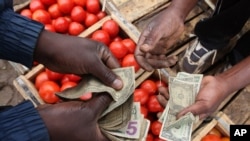Former South African President Thabo Mbeki recently lauded the efforts of five Zimbabwean academics, who’ve taken up farming in the Western Cape Province of South Africa.
The original report by GroundUp, and retold by Reuters, highlighted the successful farming efforts of Zimbabweans Albert Zinhanga, Batsirai Magunje, Walter Khumalo, Masimba Paradza and Dr. Ignatious Matimati, in Malmesbury, despite having full time careers in other fields.
The five, all friends who grew up in rural Zimbabwe, reportedly came across the plot of land in Malmesbury, while shopping for an ox to buy and slaughter to share among themselves, and decided to ask the farm’s owner, Koos Hoffman, who consented.
While some elements of the original story concerning the nature of the discussion leading up to their starting to work the land, are under dispute, what is not in dispute is that Hoffman allowed the five friends to farm the land for one year for free, including access to the farming equipment. All they had to pay for was the electricity they used.
Zinhanga, a teacher of African languages at Cravenby High School in Parow, is quoted by GroundUP as saying that he was surprised by Hoffman’s generosity because “it is very rare for a white farmer to give a black farmer land for free,” said he and his friends saw a lot of potential in the plot of land.
"The land was usable but it was not fertile,” explained Zinhanga. “So what we did if you look at the type of land that we have here -- it's a bit of sand soil, which does not have much nutrients, so you need to add value to the land so that you could farm it. And that's what basically we did we added value to the land -- the nutrients by putting chicken manure, cow dung manure trying to improve the soil, but the land was not useless."
The agricultural region located about 60 kilometers outside of Cape Town has a rich history of farming but has been experiencing drought spells over the last year, affecting output. But the farm utilizes ground water, which has helped irrigate the crops. The once empty plot is now abundant with crops such as tomatoes, spinach, broccoli, cauliflower and other vegetables.
But it is the maize crop, a staple here and in Zimbabwe, which was the most exciting for them to grow.
Batsirai Magunje, a physicist and material science engineer, said they hoped to extend the opportunity to local South Africans.
"We have plans to bring on board South Africans who are really willing to learn from us, so every window is open and there are no boundaries when you look at the future, there's no limit, we can refill the silos of South Africa."
Engineer Walter Chimanga-Khumalo said farming was a farming a calming escape from his high stress job.
"There is a huge difference, if I spend a day in the engineering sector, its stressing, its highly demanding, but when you come to the farming side of things, it's enjoyable, its stress relieving, we have a strong passion for farming. Just seeing crops growing just makes us happy."
Their farming expertise earned the new Zimbabwean farmers the 2016 small business of the year title, in the annual Zimbabwe Excellence Awards - a platform created to celebrate achievements of Zimbabweans living in South Africa.
The award’s executive director, Julius Shamu, said the five deserved the award because of their bold move.
"If you are living in a certain city you have to make use of what is there, so these guys made a unique success story whereby they actually approached the owner of the land and asked him 'could we farm here'. They didn't say let us go back to Zimbabwe and ask for land in Zimbabwe, they are working here, their families are here, they need to provide for their families and they need to be recognized. What they are doing is not about -- 'can I go back to my country?' But 'can I contribute to the city where I am staying? Can I do something better for the city.
As the new farmers provide food for South Africans, back in their home country of Zimbabwe, extreme food shortages forced President Robert Mugabe to declare a state of disaster in most rural parts of the country severely hit by the drought.
Last year, South Africa recorded its lowest annual rainfall levels since comprehensive records began in 1904 as an El Nino-driven drought rips through the region, putting millions at risk of food shortage. Southern Africa's diverse agricultural sector, from grains to livestock, has been hit hard by the weather pattern.
El Nino, however, seems to have no impact on the five Zimbabwean farmers who are working to expand their crop production from three hectares to 15 hectares and grow more vegetables, which they supply to clients at the nearby Cape Town Epping Market.
The free deal is over now and the farmers now pay the land owner $80 a hectare to farm the land.






